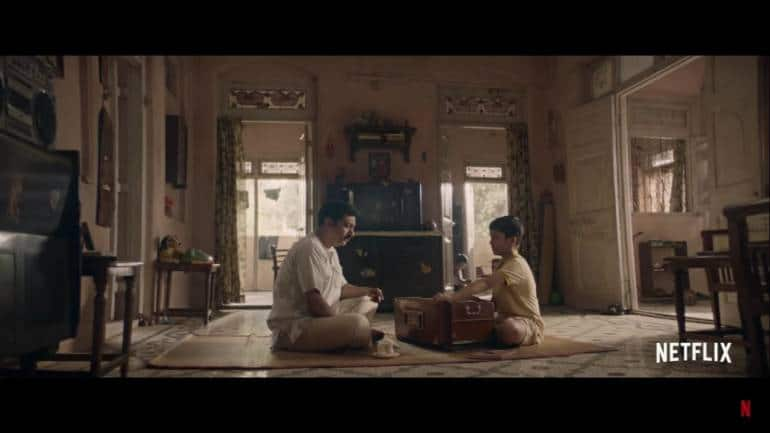



‘I’m going on the bike. I need a calm mind. You come later.’ Sharad Nerulkar (Aditya Modal) tells his grandmother and leaves the house with a kurta he wears for his music performance.
He’s a young singer in the North Indian classical tradition and he’s an uncut gem, slowly getting his edges chiselled by the constant seva of his guruji (Arun Dravid), the spidery voice of Maai in his ears offering him advice on how to be dedicated to music, a shruti box helping him in his riyaz. His journey is delightful, especially if you have ever studied music or been to a concert (even if it was a rock concert!)
There are two types of audiences for music. Since the film is all about Hindustani classical music, I will speak only of that, knowing full well it is the same for rock concerts. There is the perfectly turned out audiences alighting from fancy cars, dressed in silk and smelling of mogra flowers, fanning themselves with their gilt-edged sponsor invites; those who walk past patrons standing in queues, to the front seats ‘reserved’ for important people.
The rest of course take pride in keeping the taal (rhythm), sneer at the first lot for exclaiming ‘wah-wah!’ at the wrong moments, tell tales of how the artist sang a particular raga brilliantly at a baithak long long time ago and how he has now sold his soul to cheap gimmicks of breathless taan (‘That Shankar Mahadevan has rubbed off on so many of these ustaads… harrumph!), and that nonsense of fusion music…
This film cuts both the ‘baithak’ (private concerts at someone’s home) as well as big performances to size rather sharply. It tells the story of Sharad who gives 20-22 hours of his day to practising scales (you will hear him sing the notes in combinations) yearning to be as awesome as his teacher. The audience knows that nothing grows in the shadow of big trees. We just want the filmmakers to prove this age old saying wrong.
Shouldn’t dedication and discipline make dreams come true? Will his guruji ever say, ‘Shabaash!’ (well done!). Will his talent become truly incandescent with practice (as you saw in Whiplash or in Kill Bill even)? Or will his self doubt and inability to sing ‘khul ke’ (without hesitation) push him down the rabbit hole of despair?
He’s single-minded in his dedication to music. Lives away from his mother and sister who want him to have a job and sing as a hobby. He’s no tik-toker. His dreams are grand; he wants to be the next star of his ‘gharana’ (family of musicians that espouses a particular style of singing). He lives with his grandma, and when he’s not practising music, he’s digitising rare recordings. He’s constantly taking life lessons from a legendary musician Maai who was so good she never performed for the public, but for her guru and for music. Very much like Bruce Lee sharing the tao of Jeet Kune Do. The film follows his life graph...
 'The Disciple' is writer-director Chaitanya Tamhane's second feature film after 'Court' (2015).
'The Disciple' is writer-director Chaitanya Tamhane's second feature film after 'Court' (2015).
Some of the best moments of the film are shown when Sharad rides his motorbike through Mumbai's lonely streets late into the night, with Maai’s spidery voice in his ears urging him to seek the perfection. No matter what your profession, I am sure you too have heard someone tell you how you need to and can become an alchemist, turning everything you touch into gold.
You realise you like this guy. You nod approvingly at his efforts to sell unknown recordings (and yes, I have heard people ask for ‘Bhimsen Joshi’s abhangs’ at a sitar recital of the daughter of a world-famous sitarist or any other concert). You laugh because you know that the filmmaker was perhaps in the audience of that particular sitar recital because the film recreates the stage setting: usually the sitarist and accompanying tabla player sit next to each other and in this concert, there were two tabla players sitting at two ends of the stage and the star sitar player sat in the middle! Sneaky lad! But superb research!
The Disciple is a soft yet sharp rebuke of music traditions and performers. Those of us who grew up learning and listening to this music will smile at the references. As I watched Sharad’s musical journey from being student to teacher, the two volumes of Bhatkhande Swarlipi sitting in my bookshelf almost fell off their dusty perch. Sharad is teaching the same composition I learnt years ago! I remember singing ‘Ye ri aa li piya bina!’ and hating Raag Bhoop forever because ‘whatever do those words mean?’
It just shows how nothing has changed down the years. We had neighbourhood aunties throw things at our window when we practised our scales, but Sharad is good, and so no one yells at him asking him to shut up. I sigh into my coffee and watch as his dad instills the love of music into the young lad. I remember that we too had a Sony TC 765 reel to reel spool music player growing up...The setting is so perfect and so Marathi, you can smell the poha his mother is perhaps making in her kitchen.
The eye for detail is so brilliant I paused the film to appreciate the pressure cooker on the gas stove in guruji’s home, the satranji (dhurrie) on the floor for the students, how guruji admonishes him during the baithak, the ridiculous thermos the house help places in front of the guruji at the performance, even the discussion his dad and friends have about how rum fuelled performances are best… You’ve heard the rumours about a famous singer singing incredible bhajans but only if the steel ‘taambya’ (round bottom pot for water) was secretly filled with whiskey and water.
 Plus, the character of a music critic who owns a lot of music but hates the musicians is spot-on. I loved how young Sharad is annoyed when the critic speaks ill of his ‘gharana’. Now music gharanas are like Mafia families. With their own traditions and loyalists (Bhimsen Joshi, for example, was of the Kirana Gharana, where they launch into the main music piece immediately, without the fanfare of the introductory alaap or set of notes). Once gharanas protected their compositions and had favourite ragas. Today, these are just stories. For all these details and love for music, kudos Chaitanya Tamhane.
Plus, the character of a music critic who owns a lot of music but hates the musicians is spot-on. I loved how young Sharad is annoyed when the critic speaks ill of his ‘gharana’. Now music gharanas are like Mafia families. With their own traditions and loyalists (Bhimsen Joshi, for example, was of the Kirana Gharana, where they launch into the main music piece immediately, without the fanfare of the introductory alaap or set of notes). Once gharanas protected their compositions and had favourite ragas. Today, these are just stories. For all these details and love for music, kudos Chaitanya Tamhane.
No matter how much of a purist Sharad remains, we enjoy his humanity even more. He transcribes music and watches porn with equal seriousness in the darkness of his room. In fact I almost cringed, ‘Your granny might hear the moans! Cut the volume!’
But his vulnerability is most evident as he watches a young classical singer from nowhere participate in one of those talent hunt shows and change with success. He wants that televised success and yet loathes it. That contrasts brilliantly with the state of his career. Will he give up serving goddess Saraswati, the muse Euterpe, and pursue Lakshmi, beg Plutus to make him rich?
This is a brilliant film if you just get past the idea in your head that classical Indian music is niche. You travelled miles to hear a band from Ireland sing ‘With or without you’, no? Alan Sillitoe gave you a metaphor for the lonely life of a long distance runner: does an author stop being one when his work is published? Does a runner lose his purity if he enters a race? The Disciple has answers to these questions and so many more…
Discover the latest Business News, Sensex, and Nifty updates. Obtain Personal Finance insights, tax queries, and expert opinions on Moneycontrol or download the Moneycontrol App to stay updated!
Find the best of Al News in one place, specially curated for you every weekend.
Stay on top of the latest tech trends and biggest startup news.